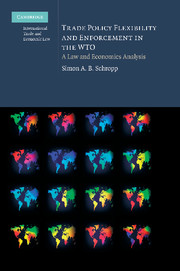Book contents
- Frontmatter
- Contents
- List of figures
- List of abbreviations
- Acknowledgements
- Foreword
- 1 Introduction: trade policy flexibility in the WTO – vice or virtue?
- PART I An introduction to incomplete contracting
- PART II Theorizing about the WTO as an incomplete contract
- 4 Adding context: the WTO as an incomplete contract
- 5 Analyzing the system of non-performance in the WTO
- PART III Flexibility and enforcement in the WTO: towards an agenda for reform
- Bibliography
- Index
5 - Analyzing the system of non-performance in the WTO
Published online by Cambridge University Press: 05 May 2010
- Frontmatter
- Contents
- List of figures
- List of abbreviations
- Acknowledgements
- Foreword
- 1 Introduction: trade policy flexibility in the WTO – vice or virtue?
- PART I An introduction to incomplete contracting
- PART II Theorizing about the WTO as an incomplete contract
- 4 Adding context: the WTO as an incomplete contract
- 5 Analyzing the system of non-performance in the WTO
- PART III Flexibility and enforcement in the WTO: towards an agenda for reform
- Bibliography
- Index
Summary
Substantive entitlements are the commitments that form the essence of contracts. Any contract that does not consider every possible contingency is by definition incomplete and must have in place a governance structure that protects its substantive entitlements from uncoordinated and, in particular, uncompensated ex post escape. At the same time, the institutional design should leave room for welfare-enhancing ex post flexibility. Safeguarding efficient post-contractual discretion is the role of a contract's system of non-performance. To that end, signatories shape secondary and tertiary rules of contracting.
The benchmark for an incomplete contract is given by the achievable first-best, the efficient “breach” contract (EBC) (section 3.4 above). The EBC mimics the outcome of the hypothetical complete contingent contract. It strikes the optimal balance between flexibility and entitlement protection: every contractual entitlement is protected in a way that prohibits opportunistic opt-out. This is equivalent to saying that injurers may engage in flexibility so as to seize welfare-enhancing ex post non-performance opportunities without harming the victims of contractual escape. Whenever one of these two conditions fails to hold, the contractual system of non-performance is out of balance. If signatories to a contract provide for provisions that are unsuccessful in safeguarding the initially traded level of commitment, a signatory expecting to assume the role of a victim is likely to commit to less cooperation up-front. Unseized flexibility opportunities, on the other hand, discourage future injurers from engaging in contractual exchange in light of unforeseen or unanticipated contingencies.
- Type
- Chapter
- Information
- Trade Policy Flexibility and Enforcement in the WTOA Law and Economics Analysis, pp. 213 - 254Publisher: Cambridge University PressPrint publication year: 2009



